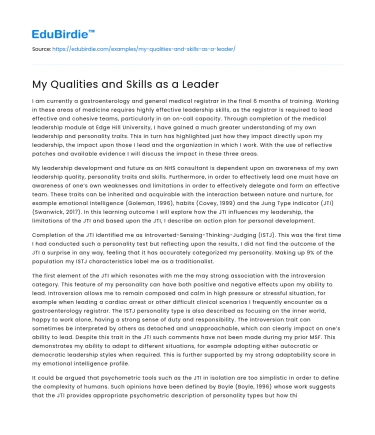I am currently a gastroenterology and general medical registrar in the final 6 months of training. Working in these areas of medicine requires highly effective leadership skills, as the registrar is required to lead effective and cohesive teams, particularly in an on-call capacity. Through completion of the medical leadership module at Edge Hill University, I have gained a much greater understanding of my own leadership and personality traits. This in turn has highlighted just how they impact directly upon my leadership, the impact upon those I lead and the organization in which I work. With the use of reflective patches and available evidence I will discuss the impact in these three areas.
My leadership development and future as an NHS consultant is dependent upon an awareness of my own leadership quality, personality traits and skills. Furthermore, in order to effectively lead one must have an awareness of one’s own weaknesses and limitations in order to effectively delegate and form an effective team. These traits can be inherited and acquirable with the interaction between nature and nurture, for example emotional intelligence (Goleman, 1996), habits (Covey, 1999) and the Jung Type Indicator (JTI) (Swanwick, 2017). In this learning outcome I will explore how the JTI influences my leadership, the limitations of the JTI and based upon the JTI, I describe an action plan for personal development.
Completion of the JTI identified me as Introverted-Sensing-Thinking-Judging (ISTJ). This was the first time I had conducted such a personality test but reflecting upon the results, I did not find the outcome of the JTI a surprise in any way, feeling that it has accurately categorized my personality. Making up 9% of the population my ISTJ characteristics label me as a traditionalist.
The first element of the JTI which resonates with me the may strong association with the introversion category. This feature of my personality can have both positive and negative effects upon my ability to lead. Introversion allows me to remain composed and calm in high pressure or stressful situation, for example when leading a cardiac arrest or other difficult clinical scenarios I frequently encounter as a gastroenterology registrar. The ISTJ personality type is also described as focusing on the inner world, happy to work alone, having a strong sense of duty and responsibility. The introversion trait can sometimes be interpreted by others as detached and unapproachable, which can clearly impact on one’s ability to lead. Despite this trait in the JTI such comments have not been made during my prior MSF. This demonstrates my ability to adapt to different situations, for example adopting either autocratic or democratic leadership styles when required. This is further supported by my strong adaptability score in my emotional intelligence profile.
It could be argued that psychometric tools such as the JTI in isolation are too simplistic in order to define the complexity of humans. Such opinions have been defined by Boyle (Boyle, 1996) whose work suggests that the JTI provides appropriate psychometric description of personality types but how this translates to a prediction of behavioral and occupational outcomes is lacking. Since this work, there have been dedicated studies to explore the impact of JTI in the workplace, including hospital executives (Lawrence, 2010). This was further emphasized by the Royal College of Physicians (Physicians, 2016) who have conducted workshops for candidates to explore their JTI to develop themselves as medical leaders.
In order to be a more effective leader I need to consider the introvert aspect of the JTI outcome and aim to adopt some of the extrovert traits. In some circumstances the combination of introvert and thinking mean that I can be a bystander to situations, particularly multi-disciplinary team meetings. I understand that in order to be an effective leader in some circumstances I will need to take a more proactive role in group discussion and lead such meeting, e.g., as the chair. On the other hand, sensing, thinking and introversion can allow for effective delegation and a transformational style. This can be highly effective when training more junior staff as part of their continued medical education. Furthermore, organizations with transformational leadership can be rewarded with positive outcomes and quality indicators. My adaptability, as evidenced by the emotional intelligence assessment, will hopefully allow for the transition according to the situational requirements.






 Stuck on your essay?
Stuck on your essay?

